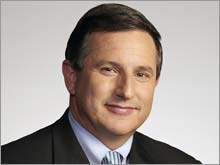|
Analysts expect solid quarter for HP
Company looks to continue its winning ways under CEO Mark Hurd; Dell shares down 32% over last 12 months.
NEW YORK (CNNMoney.com) - At this time last year, Dell was enjoying a long streak of putting up strong numbers every quarter, while rival Hewlett-Packard had just shown CEO Carly Fiorina the door after a spell of disappointing performance. What a difference a year makes.
Shares of Dell slipped 32 percent in the last 12 months as the PC maker struggled with slowing growth in its core businesses. The shares took another knock last week, slipping 6 percent in after-hours trading last Monday when the company warned that its earnings and revenue will fall short of an earlier forecast. Meanwhile, shares of HP have gained nearly 60 percent over the same period thanks to restructuring moves CEO Mark Hurd made after taking over from Fiorina. The company beat earnings and revenue estimates for three straight quarters, and analysts and investors will find out Tuesday if Hurd can do it again. The company reports its fiscal second-quarter results after the market close, and analysts are expecting HP to report earnings of 49 cents a share, a 31 percent increase from a year earlier, and sales of $22.6 billion, up 5 percent from last year, according to a survey by Thomson/FirstCall. Decent numbers expected
"The overall consensus is that this is going to be a relatively upbeat quarter," said Daniel Morgan, a portfolio manager with Synovus Investment Advisors, adding that a 31 percent rise in earnings would be pretty respectable for a company of HP's size and maturity. (Synovus owns shares of HP in some of its portfolios, but the firm is not actively buying the shares for its tech portfolio.) Brent Bracelin, an analyst at Pacific Crest Equities, is also expecting HP to turn in a solid quarter, owing mainly to the company's printing business, its largest division. Bracelin noted that operating margins - revenue after costs - have fallen for several quarters in the imaging and printing business, in part because HP has aggressively cut costs on its printing hardware to become more competitive. But he said margins improved to 14.9 percent in the most recent quarter, and he thinks they can surpass 13 percent this quarter. The company's imaging and printing business once accounted for 75 percent of the company's profit - mostly from "consumables," such as laser and toner cartridges for printers. Now printing makes up less than 60 percent of HP's profit, analysts say, not because that business is declining, but because the company's other businesses are on the rise. Bracelin said he expects other divisions to report bigger profits this quarter, including the company's storage and services business, as well as its PC business, which makes up about a third of HP's earnings. Bracelin said the PC division's contribution to HP's profit is much healthier than it had been a year earlier, and the company appears to have gained some market share at the expense of Dell in the most recent quarter. HP's share of the PC market rose 22.3 percent, while Dell's dropped 10.2 percent, according to data from industry research firm Gartner. Dell shipped about 9.4 million PCs in the quarter, while HP shipped 8.5 million. "The fact that Dell had a slip up doesn't mean it's a broad-based PC problem; it's more a Dell problem," said Morgan. Share gains will be tough to follow
While many analysts and investors are expecting solid quarterly results from HP, they point out that the market has already handsomely rewarded the company for its cost-cutting measures. Looking ahead, analysts and investors say that for the shares to appreciate even more, HP has to grow revenue. That won't be easy given HP's size - it's set to overtake IBM this year as the world's largest tech company as measured by revenue, if analyst estimates prove to be correct. "HP has too many secular challenges for them to ever be a growth company again," said Mark Lanyon, an equity analyst at Morningstar. "They are simply too big and too entrenched in declining markets." Chirag Vasavada, an analyst at T. Rowe Price whose firm owns HP shares in the funds he advises, said HP is caught in an awkward phase when it comes to appealing to investors. "The value guys who got into this stock early have made their money and, incrementally, are on their way out," he said. "And the growth guys haven't yet come aboard." HP currently trades at 16.7 times expected 2006 earnings. "Barring some really unforeseen positive shift in the business model, it looks pretty fully valued right now," said Morningstar's Lanyon. Bracelin does not own shares of HP, and his firm has no banking ties to the company. Lanyon does not own shares of HP, and Morningstar does not do investment banking. _________________ Wall Street turns against Cisco. More here.
Dell drops forecast on lowered prices. Click here for more. |
|


